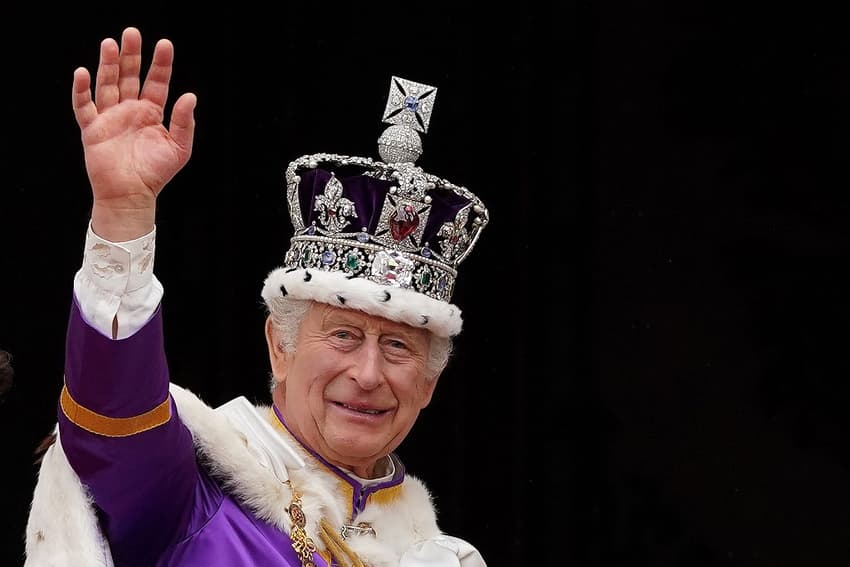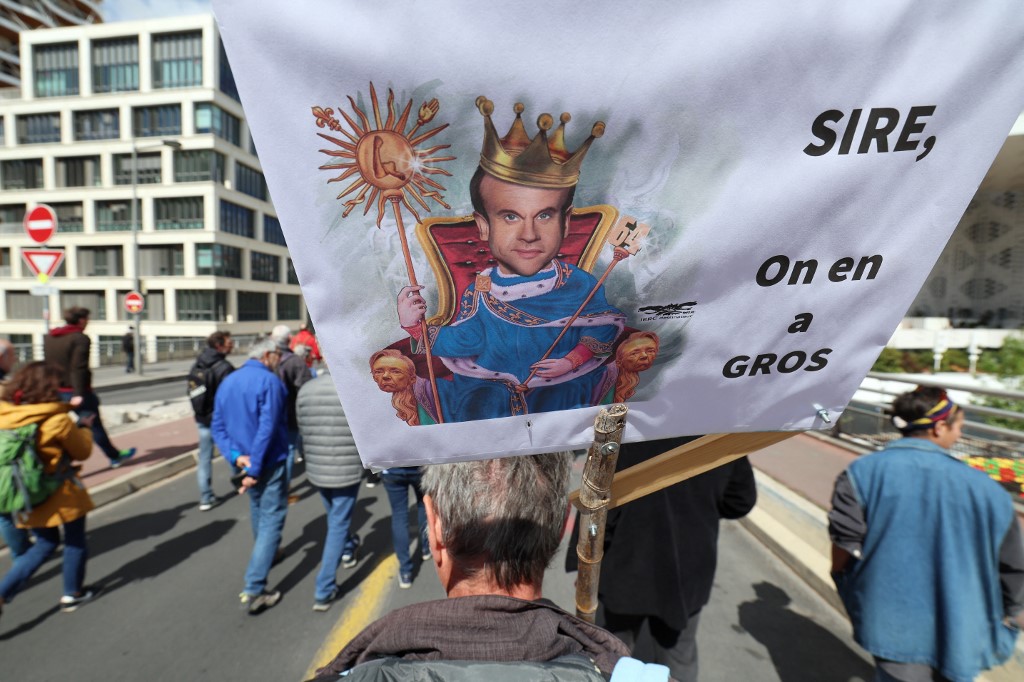'The French have a taste for princes' - Why British royals are so popular in France

They famously took a firm line with their own monarchy, back in 1793, but these days many French people are fascinated by royals, especially British ones.
Perhaps the best known thing about French history is that they guillotined their own royals back in 1793. There were a couple of brief returns to monarchy, plus a self-crowned Emperor, but these days France is a firmly republican country.
But that doesn't stop the French from showing huge interest in, and affection for, the royals on the other side of the English Channel.
The visit of King Charles and Queen Camilla - a two-day trip that takes in Paris, Versailles and Bordeaux - has sparked huge media interest with dozens of articles on the visit and on royalty in general (including one from BFM TV on how one correctly addresses a king . . . just in case you find yourself behind one in the queue in the boulangerie).
French royal mania strikes again . . . pic.twitter.com/b1u4cVWmEH
— Emma Pearson (@LocalFR_Emma) September 20, 2023
There was a similar flurry of media and public interest in his couronnement (coronation) in May - attended by, among many others, Emmanuel and Brigitte Macron.
Back in 2022 when Queen Elizabeth II died, flags were flown at half mast, the lights on the Eiffel Tower were turned off, French TV channels showed rolling news updates from the UK and French TV historian Stéphane Bern presented a specially recorded tribute programme to the Queen.
Three of France's daily newspapers made the royal death their front page story, with Le Parisien using the headline Nous l'avons tant aimée (we loved her so much), Le Figaro saying L'adieu à la reine (farewell to the queen) and Libération opting for La peine d'angleterre (England's pain, but also a pun on La reine d'angleterre).
The French papers this morning
🇫🇷🇬🇧 pic.twitter.com/mCCAhmlDKi
— Sophie Pedder (@PedderSophie) September 9, 2022
In 2021, 6 million people in France watched the funeral of Prince Phillip, 4 million watched the Queen's Diamond Jubilee in 2012 and the royal weddings of princes William and Harry attracted 9 and 8 million French viewers respectively.
Charles de Gaulle once remarked: "The French have a taste for princes, but they will always look abroad".
French presidents, such as de Gaulle, are both the political leader of the country and the head of state, and have quite a few semi-monarchical trappings to the role, such as accommodation in the very grand Elysée Palace.
Emmanuel Macron, who began his presidency styling himself as an almost royal figure before being forced by public pressure to adopt a more down-to-earth governing style, called the French "a nation of regicidal monarchists" - yearning for a strong leader yet always keen to tear them down.
One of his predecessors, François Mitterand, also remarked on this difficulty, reportedly saying in 1984: "I must be both Margaret Thatcher and Queen Elizabeth" (which conjours up a frankly alarming image).
Although the monarchy is far from an uncontroversial subject in the UK, where a significant portion of the population believe that the royals should have no official role, in France they are seen as a force for unity.
TV presenter Stéphane Bern, himself an ardent royalist, wrote a special essay in April 2022, to mark Queen Elizabeth II's Platinum Jubilee. He said: "How can we explain this French infatuation with everything related to the British monarchy Nostalgia of the sans-culottes [French revolutionaries] for the monarchic splendour? Curiosity for this unchanging institution which is not afraid to conjugate secular rites in the present? Or a formidable symbolic force that gives hope to an entire people, who believe themselves invincible as long as the queen (or king) watches over them?
"How many events in our country are still capable of bringing crowds together, across political divides, religious beliefs or social affiliations? Apart from the football World Cup, when France wins, moments of national communion are rare and, even on July 14th [France's Fête nationale] the principle of unity does not always prevail.
"If the British royal family is so popular in France, it is because it embodies the symbolic power capable of bringing together an entire people and of which we feel orphaned. The crown, which unites in diversity, seems to allow the British to find themselves and to commune around the timeless values of their nation.
"Unconsciously, there must be a kind of nostalgia, tinged with a sense of guilt, in this look of admiration and envy."
French journalist Nicolas Domenach, speaking to The Local during the royal wedding celebrations in 2018, also emphasised the sense of unity, saying: "English royalty serves to maintain the unity of the country. It has immense symbolic power, but no concrete power.
“This monarchical permanence in a democracy fascinates us because we cut off the head of our king and our queen.
"We are proud to have accomplished our Revolution, but we maintain a nostalgia, if not a remorse."
It's worth pointing out, however, that when protesters are seeking for a handy insult for president Emmanuel Macron, they frequently dub him 'le roi' (the king) - and not in a way that suggests that want the restoration of the monarchy.

A banner at a protest against pension reform depicts French President Emmanuel Macron as a king. Photo by Pascal GUYOT / AFP
Comments
See Also
Perhaps the best known thing about French history is that they guillotined their own royals back in 1793. There were a couple of brief returns to monarchy, plus a self-crowned Emperor, but these days France is a firmly republican country.
But that doesn't stop the French from showing huge interest in, and affection for, the royals on the other side of the English Channel.
The visit of King Charles and Queen Camilla - a two-day trip that takes in Paris, Versailles and Bordeaux - has sparked huge media interest with dozens of articles on the visit and on royalty in general (including one from BFM TV on how one correctly addresses a king . . . just in case you find yourself behind one in the queue in the boulangerie).
French royal mania strikes again . . . pic.twitter.com/b1u4cVWmEH
— Emma Pearson (@LocalFR_Emma) September 20, 2023
There was a similar flurry of media and public interest in his couronnement (coronation) in May - attended by, among many others, Emmanuel and Brigitte Macron.
Back in 2022 when Queen Elizabeth II died, flags were flown at half mast, the lights on the Eiffel Tower were turned off, French TV channels showed rolling news updates from the UK and French TV historian Stéphane Bern presented a specially recorded tribute programme to the Queen.
Three of France's daily newspapers made the royal death their front page story, with Le Parisien using the headline Nous l'avons tant aimée (we loved her so much), Le Figaro saying L'adieu à la reine (farewell to the queen) and Libération opting for La peine d'angleterre (England's pain, but also a pun on La reine d'angleterre).
The French papers this morning
— Sophie Pedder (@PedderSophie) September 9, 2022
🇫🇷🇬🇧 pic.twitter.com/mCCAhmlDKi
In 2021, 6 million people in France watched the funeral of Prince Phillip, 4 million watched the Queen's Diamond Jubilee in 2012 and the royal weddings of princes William and Harry attracted 9 and 8 million French viewers respectively.
Charles de Gaulle once remarked: "The French have a taste for princes, but they will always look abroad".
French presidents, such as de Gaulle, are both the political leader of the country and the head of state, and have quite a few semi-monarchical trappings to the role, such as accommodation in the very grand Elysée Palace.
Emmanuel Macron, who began his presidency styling himself as an almost royal figure before being forced by public pressure to adopt a more down-to-earth governing style, called the French "a nation of regicidal monarchists" - yearning for a strong leader yet always keen to tear them down.
One of his predecessors, François Mitterand, also remarked on this difficulty, reportedly saying in 1984: "I must be both Margaret Thatcher and Queen Elizabeth" (which conjours up a frankly alarming image).
Although the monarchy is far from an uncontroversial subject in the UK, where a significant portion of the population believe that the royals should have no official role, in France they are seen as a force for unity.
TV presenter Stéphane Bern, himself an ardent royalist, wrote a special essay in April 2022, to mark Queen Elizabeth II's Platinum Jubilee. He said: "How can we explain this French infatuation with everything related to the British monarchy Nostalgia of the sans-culottes [French revolutionaries] for the monarchic splendour? Curiosity for this unchanging institution which is not afraid to conjugate secular rites in the present? Or a formidable symbolic force that gives hope to an entire people, who believe themselves invincible as long as the queen (or king) watches over them?
"How many events in our country are still capable of bringing crowds together, across political divides, religious beliefs or social affiliations? Apart from the football World Cup, when France wins, moments of national communion are rare and, even on July 14th [France's Fête nationale] the principle of unity does not always prevail.
"If the British royal family is so popular in France, it is because it embodies the symbolic power capable of bringing together an entire people and of which we feel orphaned. The crown, which unites in diversity, seems to allow the British to find themselves and to commune around the timeless values of their nation.
"Unconsciously, there must be a kind of nostalgia, tinged with a sense of guilt, in this look of admiration and envy."
French journalist Nicolas Domenach, speaking to The Local during the royal wedding celebrations in 2018, also emphasised the sense of unity, saying: "English royalty serves to maintain the unity of the country. It has immense symbolic power, but no concrete power.
“This monarchical permanence in a democracy fascinates us because we cut off the head of our king and our queen.
"We are proud to have accomplished our Revolution, but we maintain a nostalgia, if not a remorse."
It's worth pointing out, however, that when protesters are seeking for a handy insult for president Emmanuel Macron, they frequently dub him 'le roi' (the king) - and not in a way that suggests that want the restoration of the monarchy.

Join the conversation in our comments section below. Share your own views and experience and if you have a question or suggestion for our journalists then email us at [email protected].
Please keep comments civil, constructive and on topic – and make sure to read our terms of use before getting involved.
Please log in here to leave a comment.